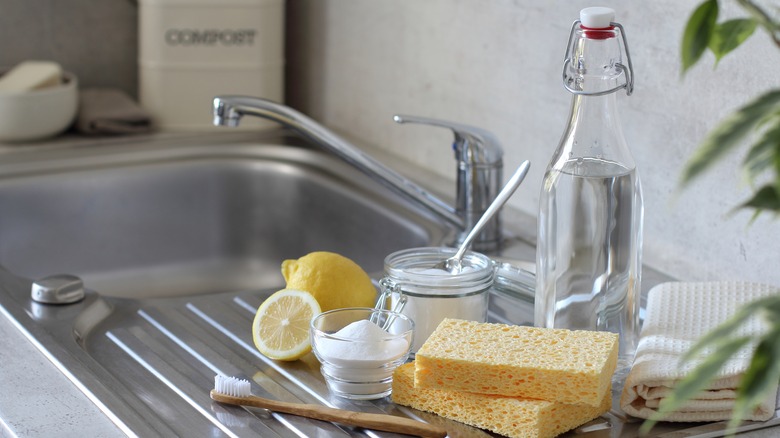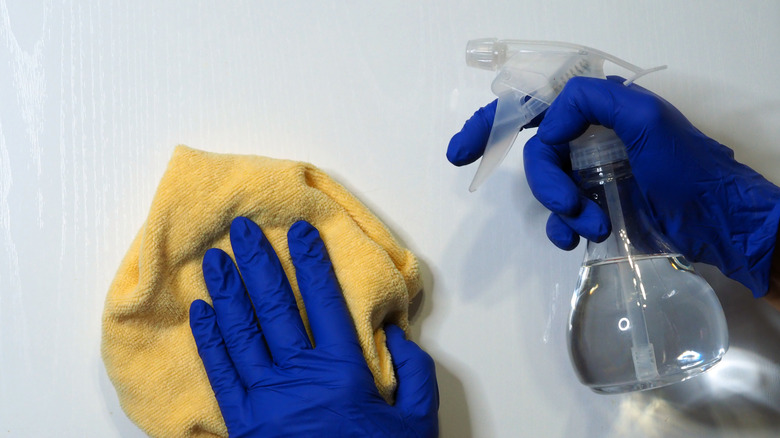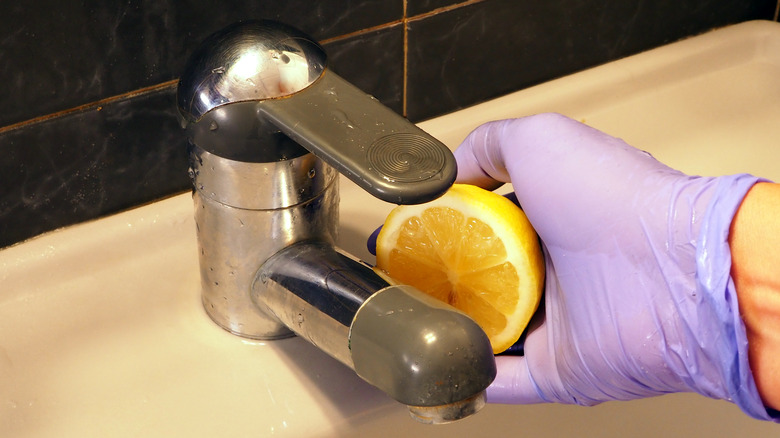Lemon Juice Vs. Vinegar: Which One To Use For A Clean & Budget-Friendly Home
We may receive a commission on purchases made from links.
If you've ever browsed your kitchen pantry and thought, "Hey, I wonder which of these items I could use to clean my home," the answer is a lot. From salt to baking soda, your kitchen is full of items that can clean naturally and on a budget. Two of the most popular ingredients to use are lemon juice and vinegar, but which one should you reach for when you want to clean on a budget? In most cases, the answer will be vinegar, because it's simply so much cheaper. At Walmart, for example, a 32-ounce bottle of 100% lemon juice is roughly double the price of a bottle of white vinegar that's the same size.
Just these two items alone can accomplish a wide range of cleaning tasks. Vinegar's acidic and antimicrobial nature makes it helpful for washing countertops and bathrooms. Lemon juice is also acidic, and it contains citric acid, which allows it to dissolve hard water deposits and clean other surfaces. However, while lemon juice and vinegar do have some properties in common, they have some differences too. Shelf life is a factor. While fresh lemon juice lasts a few days in the fridge and bottled lemon juice lasts up to 12 months, white vinegar can last indefinitely. Find out more about how to clean around the home with these two products.
Vinegar is a cleaning powerhouse
Vinegar is a versatile cleaning tool, making it a staple in any natural, DIY toolkit. It's cheap, gentle, effective, and extremely versatile. Its effectiveness is largely thanks to its pH level: it's acidic enough to break down stains and build-up but not so acidic that it risks damaging your belongings. It also kills some common bacteria like E. coli and salmonella.
There are seemingly infinite ways to use vinegar to clean. Use it on countertops, floors, bathtubs, faucets, toilets, or glass. In short, if it can be cleaned, there's probably someone out there using vinegar to do it. Still, vinegar does have limitations. It's not very effective at cutting through grease. It also shouldn't be used on stone, hardwood floors, or appliances that contain a rubber seal that the vinegar could damage over time. That includes dishwashers and washing machines. "With continual use, vinegar can literally melt hoses, causing leaks and thereby possibly all kinds of additional damage to the house," Steven Grayson, owner of Foothills Appliance Service, told Consumer Reports when talking about how vinegar can affect washing machines.
A common complaint about vinegar is its sour smell. However, note that the scent of vinegar usually dissipates quickly after cleaning, so don't let that deter you completely. You could also try cleaning with apple cider vinegar instead of white vinegar. It has a much milder smell but needs to be used with caution to avoid stains.
When to use lemon juice for cleaning
Lemon juice is slightly more acidic than vinegar, and it can kill germs too. You can use it in similar ways, and it smells way better. But because it costs more and comes in smaller quantities than vinegar (which you can buy in gallons or larger), by the time you get enough lemon juice to adequately clean, the cost adds up.
Still, lemon juice has some specific scenarios where it may be your best option. Its citric acid can dissolve hard water deposits on faucets or dishes — though you would need a lot of lemon juice to tackle anything major like a dishwasher. It can bleach out stains on fabrics. It's also great at deodorizing thanks to its strong pleasant scent. One common trick is to use lemons to remove stains from dishes or plastic food containers, like the ones that turn red from spaghetti. Many people swear by using salt and a lemon to clean cutting boards and get rid of stains and odors.
Further, remember that you don't necessarily have to choose between lemon juice and vinegar. Many DIY cleaning solutions combine both ingredients for both a fresh-smelling and powerful product.


